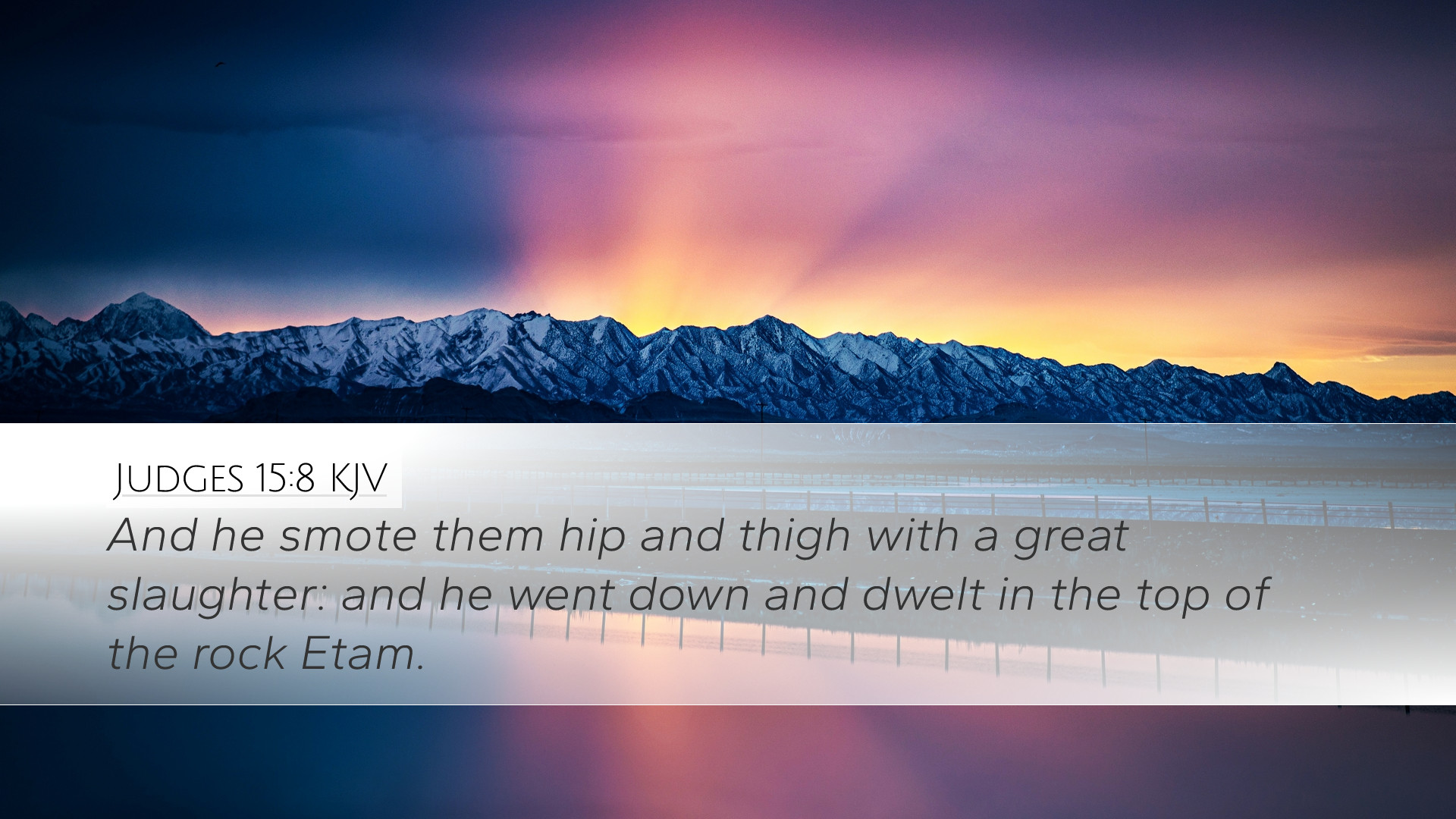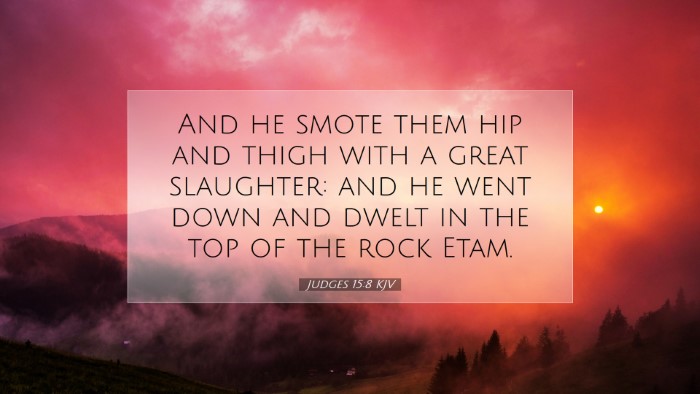Old Testament
Genesis Exodus Leviticus Numbers Deuteronomy Joshua Judges Ruth 1 Samuel 2 Samuel 1 Kings 2 Kings 1 Chronicles 2 Chronicles Ezra Nehemiah Esther Job Psalms Proverbs Ecclesiastes Song of Solomon Isaiah Jeremiah Lamentations Ezekiel Daniel Hosea Joel Amos Obadiah Jonah Micah Nahum Habakkuk Zephaniah Haggai Zechariah MalachiJudges 15:8
Judges 15:8 KJV
And he smote them hip and thigh with a great slaughter: and he went down and dwelt in the top of the rock Etam.
Judges 15:8 Bible Commentary
Bible Commentary on Judges 15:8
Judges 15:8 states, "And he smote them hip and thigh with a great slaughter: and he went down and dwelt in the top of the rock Etam." This verse occurs in the narrative of Samson, detailing a significant episode in his life. The text invites rich theological reflection and ethical consideration. Here, we will synthesize insights from various public domain commentaries, including those of Matthew Henry, Albert Barnes, and Adam Clarke.
Contextual Background
This chapter marks a crucial point in the ongoing conflict between Samson, the Israelites, and the Philistines. Samson's notoriety lies in his strength, but this strength often leads to violent confrontations. The previous chapters highlight his struggles with his own desires, the Philistines' oppression, and his role as a judge of Israel. Understanding this backdrop is essential for grasping the implications of his actions in this verse.
Verse Breakdown and Analysis
"And he smote them hip and thigh with a great slaughter"
Henry notes that "smote them hip and thigh" signifies a thorough and decisive victory over the Philistines. The phrase implies a targeted attack, indicating not merely a random act of violence but a calculated effort to annihilate an enemy. Barnes explains further that this language also evokes the image of a skilled warrior engaging in slaughter in which every part of the enemy is struck down, leaving no room for escape.
The Significance of Violence in Judges
The Judges narrative is filled with violence, often leaving readers grappling with its ethical implications. Adam Clarke comments that while the violence in this verse may be troubling, it reflects the gravity of Israel's condition under Philistine oppression. The Israelite need for deliverance justifies, in their sociocultural context, the extreme measures Samson resorts to.
The Character of Samson
Samson’s actions in this verse encapsulate his complex character. While he is raised as a deliverer, his motives often stem from personal grievances rather than national interest. Henry suggests that this reflects a deeper moral failure; Samson's individualistic approach ultimately undermines the collective liberation of Israel. This could prompt pastors and theologians to explore themes of leadership and sacrifice, contrasting divine calling with personal ambition.
"And he went down and dwelt in the top of the rock Etam"
This location signifies a retreat to a strategic refuge. Clarke emphasizes that retreating to such a stronghold illustrates both wisdom and cowardice in Samson's character. On one hand, it symbolizes a place of safety after a decisive victory, while on the other hand, it reveals a lack of trust in God for protection against retaliation from the Philistines. The post-victory retreat encourages leaders and scholars to ponder the balance between seeking refuge and demonstrating faith amid conflict.
Theological Reflections
- Violence and Divine Justice: How do we reconcile acts of violence within a theological framework? Henry posits that such actions should lead us to consider the consequences of sin and the desperate state of the people of Israel who were far removed from God's intentions.
- God’s Sovereignty: The commentary suggests that through Samson's chaotic life and actions, God's sovereignty prevails. Even in flawed human endeavors, God’s purpose in delivering Israel continues to unfold.
- The Role of Human Agency: Samson’s autonomy represents a larger theme in Judges: the interplay of divine calling and individual choice. It raises pertinent questions for scholars regarding the nature of sin and redemption in the narrative.
- Impact on Community: This verse serves as a reminder of how personal battles and failures affect communal well-being. Samson’s solitary actions have wider implications for the state of Israel, urging collective reflection among scholars regarding communal responsibility in leadership.
Conclusion
Judges 15:8 presents a vivid tableau that challenges readers to engage deeply with the themes of violence, leadership, and divine intervention. By incorporating insights from Henry, Barnes, and Clarke, we are invited to reflect critically on the text's implications for our understanding of God’s justice and human conduct. Whether viewed through a historical, theological, or ethical lens, this verse remains a compelling part of Israel's story, inviting ongoing dialogue and contemplation among pastors, students, theologians, and Bible scholars.


